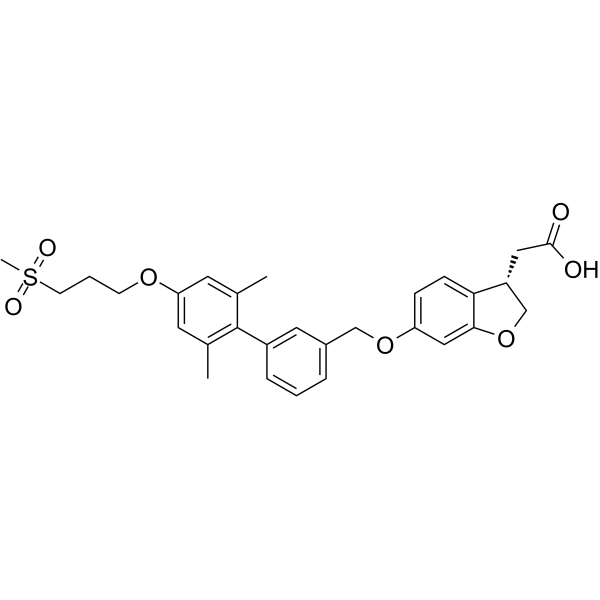All AbMole products are for research use only, cannot be used for human consumption.

Fasiglifam (TAK-875) is a potent, selective and orally bioavailable GPR40 agonist with EC50 of 72 nM. In rat insulinoma INS-1 833/15 cells, TAK-875 increased intracellular inositol monophosphate and calcium concentration, consistent with activation of the Gqα signaling pathway. The insulinotropic action of TAK-875 (10 μM) in INS-1 833/15 and primary rat islets was glucose-dependent. Prolonged exposure of cytokine-sensitive INS-1 832/13 to TAK-875 for 72 h at pharmacologically active concentrations did not alter glucose-stimulated insulin secretion, insulin content, or caspase 3/7 activity, whereas prolonged exposure to palmitic or oleic acid impaired β cell function and survival.
In an oral glucose tolerance test in type 2 diabetic N-STZ-1.5 rats, TAK-875 (1-10 mg/kg p.o.) showed a clear improvement in glucose tolerance and augmented insulin secretion. In addition, TAK-875 (10 mg/kg, p.o.) significantly augmented plasma insulin levels and reduced fasting hyperglycemia in male Zucker diabetic fatty rats, whereas in fasted normal Sprague-Dawley rats, TAK-875 neither enhanced insulin secretion nor caused hypoglycemia even at 30 mg/kg. TAK-875 enhances glucose-dependent insulin secretion and improves both postprandial and fasting hyperglycemia with a low risk of hypoglycemia and no evidence of β cell toxicity.
| Molecular Weight | 524.63 |
| Formula | C29H32O7S |
| CAS Number | 1000413-72-8 |
| Solubility (25°C) | DMSO 110 mg/mL |
| Storage |
Powder -20°C 3 years ; 4°C 2 years In solvent -80°C 6 months ; -20°C 1 month |
[2] Akifumi Kogame, et al. Characterization of Fasiglifam-Related Liver Toxicity in Dogs
| Related FAS Products |
|---|
| FASN-IN-4 tosylate
FASN-IN-4 tosylate is a potent inhibitor of fatty acid synthase (FASN) with an IC50 of 10 nM. FASN-IN-4 tosylate also inhibits SARS-CoV-2 with an EC50 of 18.6 nM. |
| Fasnall
Fasnall is a selective fatty acid synthase (FASN) inhibitor with an IC50 of 3.71 μM. |
| Fasnall benzenesulfonate
Fasnall benzenesulfonate is the benzenesulfonate salt form of Fasnall. |
| GSK837149A
GSK837149A is a selective inhibitor of human Fatty Acid Synthase (FASN) targeting the KR domain. GSK837149A has reversible inhibition effect on FASN and selectivity for type I FASN (Ki=30 nM). GSK837149A is also a competitive inhibitor of NADPH and a non-competitive inhibitor of acetoacetyl-CoA. GSK837149A can be used for the research of obesity and breast cancer. |
| IPI-9119
IPI-9119 is an orally active, selective and irreversible Fatty Acid Synthase (FASN) inhibitor, with an IC50 of 0.3 nM. |
All AbMole products are for research use only, cannot be used for human consumption or veterinary use. We do not provide products or services to individuals. Please comply with the intended use and do not use AbMole products for any other purpose.


Products are for research use only. Not for human use. We do not sell to patients.
© Copyright 2010-2024 AbMole BioScience. All Rights Reserved.
